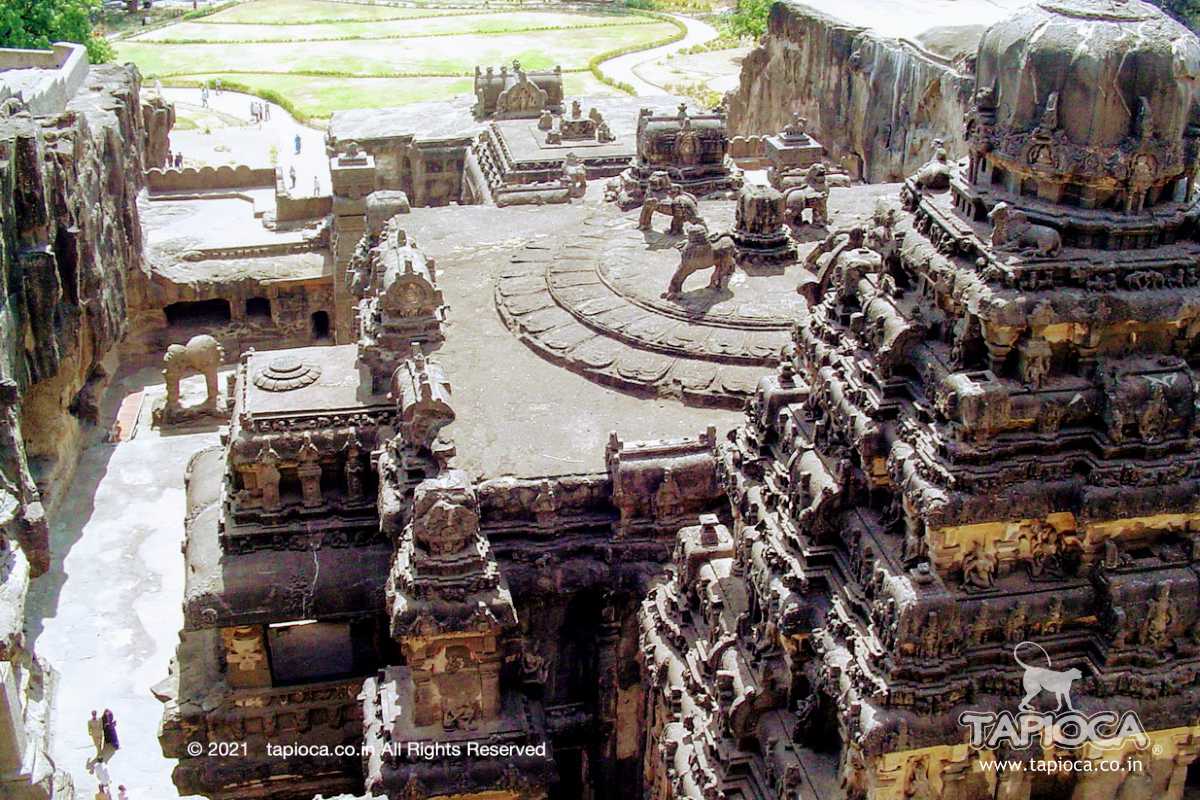World Heritage Sites in India
The full list with brief description of 41 UNESCO World Heritage Sites in India

Kailasanath Temple, is the unrivaled centerpiece of Ellora Caves.
The unrivaled centerpiece of Ellora Caves.
L
ist of word heritage sites in IndiaAgra Fort
Our journey begins at the majestic Agra Fort, a symbol of Mughal grandeur. This fortress, constructed of red sandstone, narrates tales of emperors and their opulent lifestyles. As we wander through its corridors, we're transported to a bygone era of regal splendor.
Ajanta Caves
Nestled in the heart of Maharashtra, the Ajanta Caves unfold a mesmerizing narrative of ancient rock-cut architecture. These caves, adorned with intricate sculptures and paintings, provide a glimpse into the artistic zenith of ancient India.
Archaeological Site of Nalanda Mahavihara at Nalanda, Bihar
A pilgrimage for knowledge seekers, Nalanda Mahavihara, an archaeological gem, stands as a testament to ancient India's intellectual prowess. The ruins of this ancient university resonate with the echoes of scholarly pursuits from centuries past.
Buddhist Monuments at Sanchi
The tranquility of Sanchi's Buddhist monuments transports us to a spiritual realm. With its iconic stupas and ancient relics, Sanchi unfolds the spiritual tapestry of Buddhism, inviting contemplation and reflection.
Champaner-Pavagadh Archaeological Park
A UNESCO World Heritage Site with a blend of Hindu and Islamic architecture, Champaner-Pavagadh Archaeological Park paints a vivid picture of cultural amalgamation. The intricately designed structures narrate tales of a bygone era.
Chhatrapati Shivaji Terminus (Victoria Terminus)
A symbol of Mumbai's colonial past, Chhatrapati Shivaji Terminus, with its Victorian Gothic and Art Deco influences, stands as an architectural marvel. It not only serves as a bustling railway station but also tells the story of Mumbai's evolution.
Churches and Convents of Goa
The Churches and Convents of Goa reflect the state's Portuguese colonial legacy. With their Baroque architecture and ornate interiors, these structures offer a glimpse into the cultural fusion that defines Goa.
Dholavira: A Harappan City
Journeying back to the Harappan civilization, Dholavira unravels the mysteries of urban planning and advanced engineering. This archaeological site provides insights into the sophistication of ancient urban living.
Ellora Caves
The Ellora Caves, a masterpiece of rock-cut architecture, showcases the harmonious coexistence of Hindu, Jain, and Buddhist monuments. Carved out of solid rock, these caves narrate stories of religious diversity and artistic brilliance.
Elephanta Caves
Set against the backdrop of Mumbai's bustling cityscape, the Elephanta Caves house ancient sculptures dedicated to Lord Shiva. A short boat ride transports visitors to this island sanctuary, offering a tranquil escape.
As we conclude this virtual journey through India's UNESCO World Heritage Sites, it's evident that each site narrates a unique story, contributing to the rich tapestry of India's cultural heritage. Whether it's the architectural marvels, ancient universities, or the spiritual sanctuaries, these sites invite us to explore the depths of India's history and cultural legacy.
Fatehpur Sikri
Our next stop brings us to the deserted city of Fatehpur Sikri, a masterpiece of Mughal architecture. This red sandstone city, built by Emperor Akbar, stands frozen in time, telling stories of imperial grandeur and architectural brilliance.
Great Himalayan National Park Conservation Area
Nature takes center stage as we venture into the Great Himalayan National Park Conservation Area. This sanctuary, nestled in the majestic Himalayas, is a haven for biodiversity. Its pristine landscapes and diverse ecosystems make it a UNESCO-recognized treasure.
Great Living Chola Temples
The Chola dynasty's architectural prowess is showcased in the Great Living Chola Temples. These temples, including the Brihadeeswarar Temple, exemplify the heights of Dravidian architecture, transporting visitors to a bygone era of cultural flourishing.
Group of Monuments at Hampi
Hampi, the erstwhile capital of the Vijayanagara Empire, unfolds before us with its captivating ruins and intricate stone-carved structures. The Virupaksha Temple and the Vitthala Temple complex are among the jewels that make Hampi a UNESCO World Heritage Site.
Group of Monuments at Mahabalipuram
Mahabalipuram, a coastal town adorned with rock-cut wonders, beckons us to explore its Group of Monuments. The Shore Temple, Pancha Rathas, and Arjuna's Penance showcase the architectural brilliance of the Pallava dynasty.
16. Group of Monuments at Pattadakal
Pattadakal, a harmonious blend of northern and southern Indian architectural styles, is our next destination. The intricately carved temples here, representing both Chalukyan and Dravidian styles, tell stories of cultural confluence.
Hill Forts of Rajasthan
The rugged landscapes of Rajasthan are adorned with majestic forts, and our journey takes us to the Hill Forts. Chittorgarh, Kumbhalgarh, Ranthambore, Amber, and Jaisalmer Forts stand as testaments to the region's rich history and strategic significance.
Historic City of Ahmedabad
Ahmadabad, a city with a rich cultural and architectural heritage, invites us to explore its historic quarters. The city's pols (traditional housing clusters) and architectural ensembles reflect its multicultural past and vibrant present.
Humayun's Tomb, Delhi
In the heart of Delhi, Humayun's Tomb stands as a masterpiece of Mughal architecture. This UNESCO-listed site, with its lush gardens and intricate tomb structure, pays homage to the Mughal Emperor Humayun.
Jaipur City, Rajasthan
This city, with its vibrant palaces, forts, and intricately designed markets, captivates visitors with its regal charm. The City Palace, Hawa Mahal, and Jantar Mantar are among the architectural gems.
Kakatiya Rudreshwara (Ramappa) Temple, Telangana
In the heart of Telangana, the Ramappa Temple stands as a testament to the Kakatiya dynasty's architectural brilliance. This ancient structure, adorned with intricate carvings, reflects the cultural ethos of medieval India.
Kaziranga National Park
The northeastern state of Assam hosts the magnificent Kaziranga National Park, a UNESCO World Heritage Site and a biodiversity hotspot. Home to the one-horned rhinoceros and diverse wildlife, Kaziranga is a conservation success story.
Keoladeo National Park
Formerly known as Bharatpur Bird Sanctuary, Keoladeo National Park in Rajasthan beckons bird enthusiasts. The wetlands and diverse avian species make it a haven for birdwatching, earning its UNESCO recognition.
Khajuraho Group of Monuments
The Khajuraho Group of Monuments, with its intricately carved temples, showcases the artistic brilliance of the Chandela dynasty. These temples, adorned with exquisite sculptures, narrate tales of love, life, and spirituality.
Manas Wildlife Sanctuary
Nestled at the foothills of the Himalayas, Manas Wildlife Sanctuary is a haven for diverse flora and fauna. This sanctuary, with its grasslands and dense forests, is a UNESCO World Heritage Site and a tiger reserve.
Mahabodhi Temple Complex at Bodh Gaya
Bodh Gaya, the sacred land where enlightenment dawned upon Lord Buddha, is home to the Mahabodhi Temple Complex. Pilgrims and seekers alike find solace in this UNESCO-listed site, symbolizing the birth of Buddhism.
Mountain Railways of India
Embarking on a different kind of journey, we traverse the scenic Mountain Railways of India. The Darjeeling Himalayan Railway, Nilgiri Mountain Railway, and Kalka-Shimla Railway offer a nostalgic ride through picturesque landscapes.
Nanda Devi and Valley of Flowers National Parks
In the Garhwal Himalayas, Nanda Devi and Valley of Flowers National Parks unfold their natural beauty. The snow-capped peaks and vibrant floral meadows are a testament to the region's pristine ecology.
Qutb Minar and its Monuments, Delhi
Delhi's skyline is graced by the imposing Qutb Minar, a UNESCO World Heritage Site. The Qutb complex, with its ancient structures and intricate carvings, takes us on a journey through India's medieval history.
Rani-ki-Vav (the Queen’s Stepwell) at Patan, Gujarat
The stepwells of Gujarat hold architectural marvels, and Rani-ki-Vav in Patan stands out. This intricately designed stepwell, adorned with sculptures, is a testament to ancient water conservation and architectural prowess.
Red Fort , Delhi
In the heart of Delhi, the Red Fort Complex unfolds the grandeur of Mughal architecture. This historical site, with its majestic structures, including the Diwan-i-Aam and Diwan-i-Khas, echoes the tales of imperial splendor.
Rock Shelters of Bhimbetka
Venturing into central India, the Rock Shelters of Bhimbetka take us back to prehistoric times. These rock shelters, adorned with ancient cave paintings, offer a glimpse into the lives of early humans.
Sacred Ensembles of the Hoysalas
The Hoysala temples in Karnataka, with their intricate sculptures, form the Sacred Ensembles of the Hoysalas. These architectural wonders, dedicated to various deities, are a testament to the region's cultural richness.
Santiniketan
Founded by Rabindranath Tagore, Santiniketan in West Bengal is a unique blend of education, art, and culture. Visva-Bharati University and the serene surroundings make it a UNESCO-recognized center of learning and creativity.
Sundarbans National Park
The Sundarbans, a vast mangrove delta in West Bengal, is home to the Royal Bengal Tiger. The mangrove ecosystem and diverse wildlife, including the elusive tiger, make it a UNESCO-listed site.
Sun Temple, Konârak
The Sun Temple at Konârak, with its stunning architecture and intricate carvings, is a marvel dedicated to the solar deity. The temple's chariot-like structure and detailed sculptures make it a UNESCO World Heritage Site.
37. Taj Mahal
No journey through India's UNESCO treasures is complete without a visit to the iconic Taj Mahal. A symbol of eternal love, this white marble mausoleum in Agra captivates visitors with its timeless beauty.
The Architectural Work of Le Corbusier, an Outstanding Contribution to the Modern Movement
Chandigarh, designed by the legendary architect Le Corbusier, stands as a modernist masterpiece. The city's unique urban planning and architectural elements earn it a UNESCO recognition for its outstanding contribution to the modern movement.
Jantar Mantar, Jaipur
The astronomical observatory of Jantar Mantar in Jaipur, with its large masonry instruments, reflects India's scientific heritage. Each structure serves a specific astronomical purpose, showcasing the precision of ancient Indian astronomers.
Victorian Gothic and Art Deco Ensembles of Mumbai
Mumbai's skyline narrates stories of colonial and post-colonial architectural styles. The Victorian Gothic and Art Deco Ensembles, with structures like the Chhatrapati Shivaji Maharaj Terminus, represent the city's architectural evolution.
Western Ghats
Western Ghats, a mountain range that cradles biodiversity hotspots. This UNESCO-listed natural wonder spans six states, showcasing diverse ecosystems and endemic species.
| UNESCO World Heritage Site |
|---|
| Agra Fort |
| Ajanta Caves |
| Nalanda Mahavihara at Nalanda, Bihar |
| Buddhist Monuments at Sanchi |
| Champaner-Pavagadh Archaeological Park |
| Chhatrapati Shivaji Terminus (Victoria Terminus) |
| Churches and Convents of Goa |
| Dholavira: a Harappan City |
| Ellora Caves |
| Elephanta Caves |
| Fatehpur Sikri |
| Great Himalayan National Park Conservation Area |
| Great Living Chola Temples |
| Group of Monuments at Hampi |
| Group of Monuments at Mahabalipuram |
| Group of Monuments at Pattadakal |
| Hill Forts of Rajasthan |
| Historic City of Ahmedabad |
| Humayun's Tomb, Delhi |
| Jaipur City, Rajasthan |
| Kakatiya Rudreshwara (Ramappa) Temple, Telangana |
| Kaziranga National Park |
| Keoladeo National Park |
| Khajuraho Group of Monuments |
| Manas Wildlife Sanctuary |
| Mahabodhi Temple Complex at Bodh Gaya |
| Mountain Railways of India |
| Nanda Devi and Valley of Flowers National Parks |
| Qutb Minar and its Monuments, Delhi |
| Rani-ki-Vav (the Queen’s Stepwell) at Patan, Gujarat |
| Red Fort Complex |
| Rock Shelters of Bhimbetka |
| Sacred Ensembles of the Hoysalas |
| Santiniketan |
| Sundarbans National Park |
| Sun Temple, Konârak |
| Taj Mahal |
| The Architectural Work of Le Corbusier, an Outstanding Contribution to the Modern Movement * |
| The Jantar Mantar, Jaipur |
| Victorian Gothic and Art Deco Ensembles of Mumbai |
| Western Ghats |
National Parks of India
India has more than 200 wildlife sanctuaries and about 100 of them are classified as National Parks. Here is a list of national parks of India. The names of the national parks are organized according to the state in which they belong to. Some of the national parks are speared over many states and only one state in listed in such cases. You can see the same list of national parks in India here arranged in the alphabetical order of their names.
